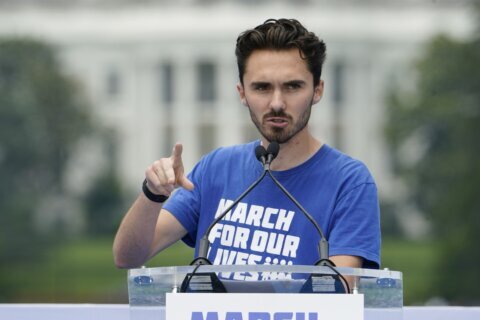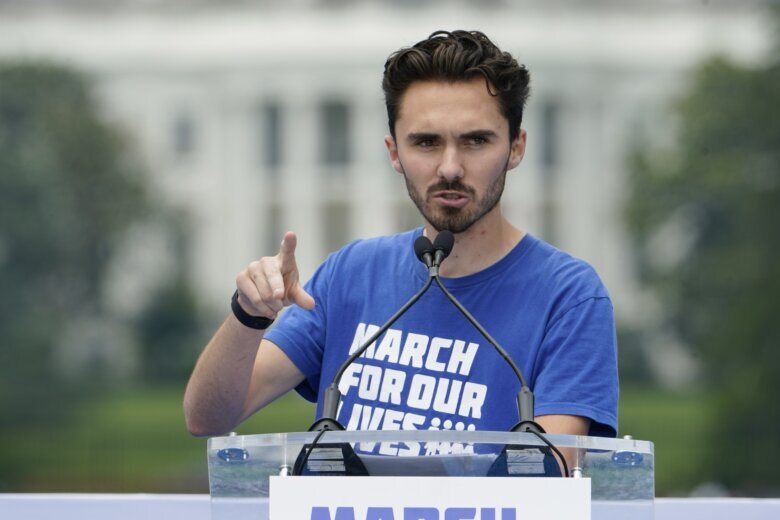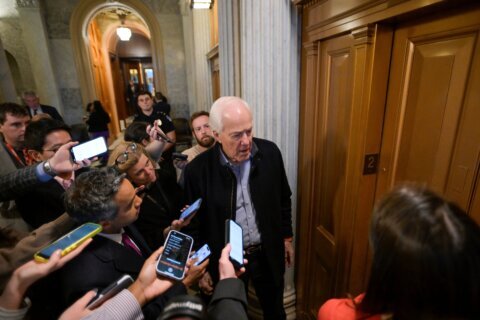
“It feels like a lifetime has gone by,” said David Hogg. It was February 14, 2018, when Hogg, then 17, and other terrified students at Marjory Stoneman Douglas High School in Parkland, Florida, sheltered in classrooms and closets as a 19-year-old gunman rampaged through their school.
“I was really, really scared, and I kind of felt like the adrenaline had rushed down my spine. But I immediately heard in the back of my head my dad’s voice: ‘If anything ever happens, you have to stay calm.'”
So, locked down with other students, Hogg started recording videos, in case they didn’t survive.
“We heard more gunshots, and that was when we realized: this was not a drill.”
Seventeen people were murdered that day, 17 more injured. Heartbroken, Hogg joined with fellow students like Emma González (now known as “X”) to demand tougher gun laws. At a February 18 press conference, González cried out, “He wouldn’t have harmed that many students with a knife!”
They would build a national movement, March For Our Lives. Their first protest on March 24, 2018, in Washington, D.C., drew some 800,000 people. Speaking to the crowd, Hogg said, “When politicians send their ‘thoughts and prayers,’ with no action, we say, ‘No more!'”
As one of the leaders of the movement, Hogg was praised, and reviled. And there were death threats. “Yes. Many, many, many, many,” he said.
But he and his fellow students persevered, pressuring both state and federal lawmakers. Even in their home state, gun-friendly Florida, they helped get the gun purchase age upped to 21; and a so-called “red flag law” was passed that allows guns to be temporarily taken from people who make specific threats, like the one that was sent to David Hogg’s mother.
“It said, ‘F*** with the NRA and you’ll be DOA,'” said Hog. “This person lived, like, 20 minutes away from us. We used the law that we created after Parkland to disarm that individual. And because of the law that we passed, it very may well have stopped me from having to bury my own mother. And that same law has been used over 6,000 times since Parkland.”
Braver said, “Seeing these children stand up in a way that adults did not, really touched a chord with a lot of people.”
“Yes. It is incredibly inspiring that we stood up,” said Hogg. “But young people having to stand up to not die in their classrooms is not a good sign. It’s as good of a sign as a canary passing out in the coal mine is for our democracy.”
“In a way, it was almost like, ‘Let the kids do it.'”
“One-hundred percent. And that is, time and time again, one of the most incredibly frustrating things, probably the most insulting: it’s all the people that we’ve had come up to us and say, ‘My generation really screwed up, but we’re glad that you kids are here to fix it,’ and just acting like they had no role in that.”
It all took a toll. Now 22, and a Harvard senior majoring in history, Hogg is active, but not full-time working for March For Our Lives. He told “Sunday Morning” that, for a few years, he just felt “numb,” and that he’d suffered from post-traumatic stress disorder (PTSD).
He is, today, “much better, thanks to therapy. My freshman year was really, really, really hard. And maybe you call it survivor’s guilt, I don’t know what it was, but it just didn’t feel like I needed to address it because the movement was so important that I just sacrificed everything for it. So, I had to just learn to say no, and really focus on being a student, which was, honestly, the hardest thing that I had to learn in college.”
Hogg believes the efforts of gun control advocates in getting scores of laws passed since 2018 have stopped some mass shootings. But he acknowledges they have still increased – some 600 just last year.
And he is especially haunted by the tragedy in Uvalde, Texas, that surpassed Parkland, with 19 children and two adults killed.
Braver asked, “What goes through your mind, what goes through your heart as that is happening?”
“Guilt,” said Hogg. “It’s a lot of guilt. We came out and we literally said, ‘Never again.’ Obviously, that didn’t work, unfortunately.”
But Hogg plans to continue advocating for more gun control when he graduates this spring, and he has a strategy.
Braver asked, “Do you see a model out there where there’s something else that maybe people thought, ‘They’ll never overcome the lobby’?”
Yes: Tobacco. The tobacco industry is exactly the model that I think of in terms of the decades of work that it will take to address this issue.”
He and members of his team may have been heckled on Capitol Hill by Marjorie Taylor Greene, now a Republican Congresswoman.
But David Hogg believes that all Americans can and must come together to prevent more mass shootings:
“We need to put our politics aside, and get something done,” he said, “because ultimately, it doesn’t matter if you’re a Republican or a Democrat, we all have people that we care about, and none of us want gun violence to continue.”







